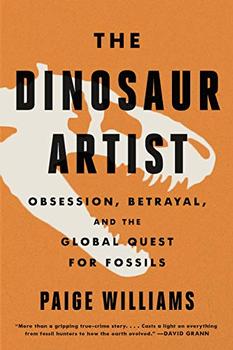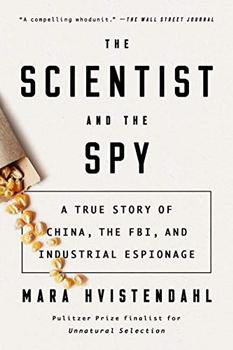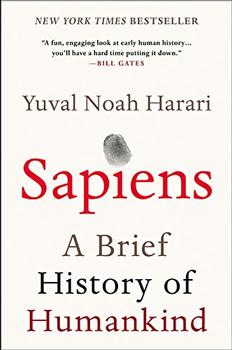Summary | Excerpt | Reviews | Beyond the book | Read-Alikes | Genres & Themes | Author Bio

Obsession, Betrayal, and the Quest for Earth's Ultimate Trophy
by Paige WilliamsNew Yorker magazine staff writer Paige Williams explores the riveting and perilous world of fossil collectors in this true tale of one Florida man's attempt to sell a dinosaur skeleton from Mongolia.
In 2012, a New York auction catalogue boasted an unusual offering: "a superb Tyrannosaurus skeleton." In fact, Lot 49135 consisted of a nearly complete T. bataar, a close cousin to the most famous animal that ever lived. The fossils now on display in a Manhattan event space had been unearthed in Mongolia, more than 6,000 miles away. At eight-feet high and 24 feet long, the specimen was spectacular, and when the gavel sounded the winning bid was over $1 million.
Eric Prokopi, a thirty-eight-year-old Floridian, was the man who had brought this extraordinary skeleton to market. A onetime swimmer who spent his teenage years diving for shark teeth, Prokopi's singular obsession with fossils fueled a thriving business hunting, preparing, and selling specimens, to clients ranging from natural history museums to avid private collectors like actor Leonardo DiCaprio.
But there was a problem. This time, facing financial strain, had Prokopi gone too far? As the T. bataar went to auction, a network of paleontologists alerted the government of Mongolia to the eye-catching lot. As an international custody battle ensued, Prokopi watched as his own world unraveled.
In the tradition of The Orchid Thief, The Dinosaur Artist is a stunning work of narrative journalism about humans' relationship with natural history and a seemingly intractable conflict between science and commerce. A story that stretches from Florida's Land O' Lakes to the Gobi Desert, The Dinosaur Artist illuminates the history of fossil collecting - a murky, sometimes risky business, populated by eccentrics and obsessives, where the lines between poacher and hunter, collector and smuggler, enthusiast and opportunist, can easily blur.
In her first book, Paige Williams has given readers an irresistible story that spans continents, cultures, and millennia as she examines the question of who, ultimately, owns the past.
The eponymous dinosaur artist, 38-year-old Eric Prokopi, is the hapless protagonist in a story with roots that crisscross the planet and date back to the 12th century. Every detail builds to a crescendo of events, greed, and crossed purposes that left me breathless...continued
Full Review
(648 words)
This review is available to non-members for a limited time. For full access,
become a member today.
(Reviewed by Donna Chavez).
 Scientific discoveries were once often made by amateurs (often self-educated, curious members of the upper class), who carved out disciplines based on their interests in fields such as medicine, astronomy, physics and natural history, to name a few. The word "amateur" has a Latin etymological root – amator – meaning "lover." Although these days the front lines of scientific discovery are mainly peopled by professional scientists, there is still room for the amateur scientist driven by a passion for an area of study.
Scientific discoveries were once often made by amateurs (often self-educated, curious members of the upper class), who carved out disciplines based on their interests in fields such as medicine, astronomy, physics and natural history, to name a few. The word "amateur" has a Latin etymological root – amator – meaning "lover." Although these days the front lines of scientific discovery are mainly peopled by professional scientists, there is still room for the amateur scientist driven by a passion for an area of study.
In The Dinosaur Artist, Williams quotes former curator of the Department of Paleobiology at the Smithsonian Institution Clayton Ray, who stressed the importance of the amateur community, explaining that "an ever ...
This "beyond the book" feature is available to non-members for a limited time. Join today for full access.

If you liked The Dinosaur Artist, try these:

by Mara Hvistendahl
Published 2021
A riveting true story of industrial espionage in which a Chinese-born scientist is pursued by the U.S. government for trying to steal trade secrets, by a finalist for the Pulitzer Prize in nonfiction.

by Yuval Noah Harari
Published 2018
A groundbreaking narrative of humanity's creation and evolution that explores the ways in which biology and history have defined us and enhanced our understanding of what it means to be "human."